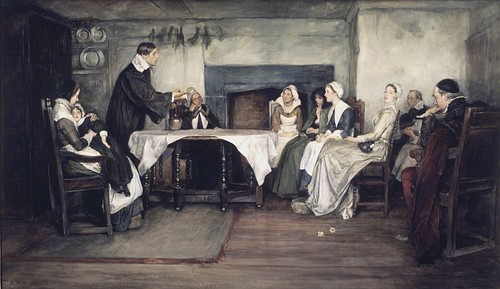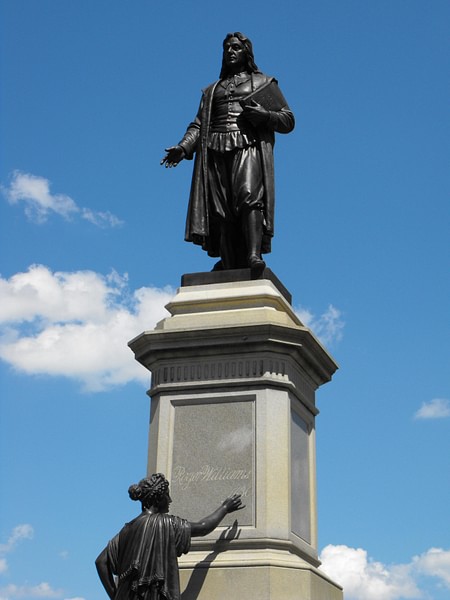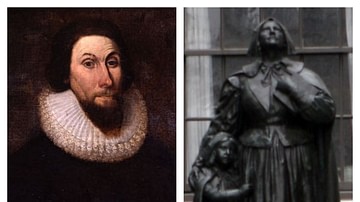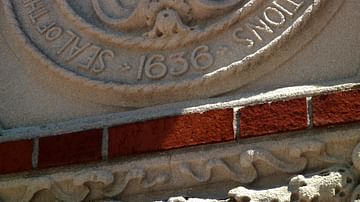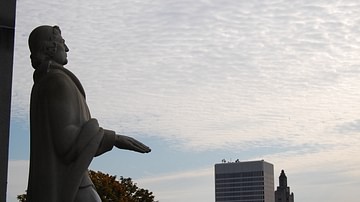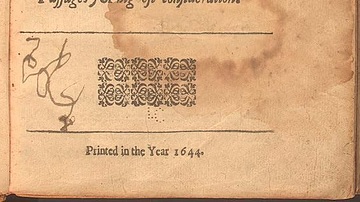The Puritans who settled New England claimed they came to the New World for religious freedom but, once settled, made it clear that this freedom was for themselves only and dissent would not be tolerated. Although the most famous example of this is Anne Hutchinson (l. 1591-1643 CE) who was banished from Massachusetts Bay Colony for her religious views in 1638 CE, an earlier illustration of this same kind of reaction to dissent is the banishment of the Puritan separatist minister Roger Williams (l. 1603-1683 CE) by the Puritan magistrate and second governor of Massachusetts Bay Colony, John Winthrop (l. c. 1588-1649 CE) in the fall of 1635 CE.
Williams was at first welcomed by the magistrates of the colony, including Winthrop, but his vision of Protestant Christianity clashed with theirs as well as with the leadership of the Plymouth Colony headed by William Bradford (l. 1590-1657 CE). Williams left Massachusetts Bay Colony for the Plymouth Plantation in 1631 CE but, finding them too legalistic, returned to the Massachusetts Bay Colony in 1633 CE only to find himself called to answer charges in court for his beliefs. Williams maintained that the path of true Christianity could only be realized through the liberty of conscience in which each individual was free to understand God in their own way and live that belief; Winthrop maintained that only through adherence to a collective, unified vision could Christianity be practiced in accordance with biblical precepts and, further, that this was the best course for the success not only of his colony but for Christianity in general.
The conflict between these two men, and the visions they represented, eventually resulted in Williams' banishment from the colony and his establishment of the Providence Plantation (later Providence, Rhode Island). In the modern era, Williams is usually regarded as a great champion of religious freedom – and rightly so – while Winthrop's arguments are dismissed as the product of religious fanaticism and rigid dogma. Both men were equally intolerant in their own ways, however, and both were arguing for religious freedom as they defined that concept. Their conflicting views, and those of their spiritual allies - however different - would eventually go toward shaping the political and religious climate of New England.
Winthrop's Vision
John Winthrop was an English Puritan lawyer who led 700 Puritan colonists to New England in 1630 CE at the start of what has come to be known as the Great Migration (also the Puritan Migration) of 1630-1640 CE. Winthrop's vision is made clear in the sermon A Model of Christian Charity delivered either just before leaving England or onboard the ship Arbella en route to the New World. Winthrop envisioned the colony they were going to establish as 'a city upon a hill' drawing on the line from Matthew 5:14 where Jesus Christ tells his followers, "You are the light of the world. A city that is set upon a hill cannot be hidden." The new colony would be a beacon of light to the rest of the world, he claimed, as well as a model of a Christian community, which would serve to inspire and encourage others in the faith.
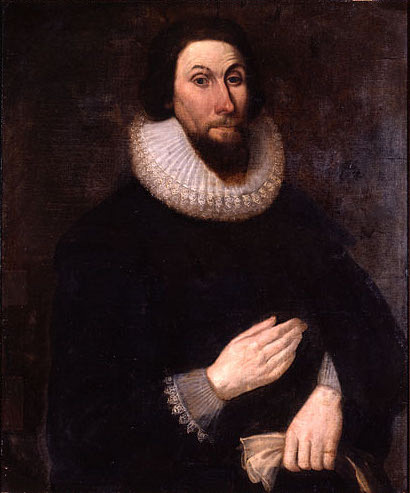
At the same time, he said, those who had chosen to make the journey and establish the settlement had entered into a covenant with God. The proof of their faithfulness in this agreement would be the success of the colony and this could only be achieved by unity and conformity to a single vision of what it meant to be a Christian. If they kept the covenant, God would reward them with great blessings and would dwell among their 'city upon a hill' while, if they failed to keep it, they could expect God's wrath as well as the scorn and mockery of the entire world which, according to Winthrop, was watching them. Winthrop writes:
Thus stands the cause between God and us, we are entered into covenant with him for this work, we have taken out a commission, the Lord hath given us leave to draw our own articles we have professed to enterprise these actions upon these and these ends, we have hereupon besought him of favor and blessing. Now, if the Lord shall please to hear us, and bring us in peace to the place we desire, then hath he ratified this covenant and sealed our commission…For we must consider that we shall be as a city upon a hill, the eyes of all people are upon us; so that if we shall deal falsely with our God in this work we have undertaken and so cause him to withdraw his present help from us, we shall be made a story and a by-word through the world. (Hall, 169)
The success of the colony depended on a "conformity with the work and end we aim at", and this conformity began with adherence to a single religious vision (Hall, 168). Those who conformed to this vision and encouraged unity of purpose would be welcome members of the community; those who did not would be asked or compelled to leave. Religious freedom, therefore, was defined by conformity to the vision of the larger community.
Williams' Vision
Roger Williams was also a Puritan but had embraced the more radical view of the separatists. The Puritans sought to change the Anglican Church from the inside, working to 'purify' it of the Catholic elements it had retained; separatists felt the Church was wholly corrupt and one needed to separate one's self from it as a true believer in Christ. The only acceptable paradigm for a Christian community was the one depicted in the biblical Book of Acts which had none of the trappings, rules, and pageantry of the Anglican Church. At the same time, however, Williams was far more tolerant than many of his fellow Separatists, having been influenced by the English jurist Sir Edward Coke (l. 1552-1634 CE) to whom he was apprenticed as a teenager.
Coke's focus on equality before the law encouraged Williams to consider the validity of other's religious views, and this influence was coupled with the concept of liberty of conscience from the churches of the Netherlands which Williams had embraced. This concept maintained that everyone was, or should be, free to follow the dictates of their own conscience in religious matters and be able to observe their faith without fear of persecution.
Williams and his wife Mary left England in 1630 CE to escape the persecution of Puritans by the Anglican Church and had acquired a reputation as a powerful preacher before arriving at Massachusetts Bay Colony in early 1631 CE. He was welcomed by Winthrop and the other magistrates until they realized his views sharply conflicted with their own. Among Williams' more controversial claims were:
- Magistrates had no right to punish citizens in civil court for religious views or behavior dictated by those views.
- No one should be punished for breaches of the Ten Commandments (especially not observing the Sabbath) if their religious understanding informed their decision.
- Neither James I, Charles I, nor any other English monarch had the right to claim lands as their own in North America; the lands belonged to the Native Americans.
- Everyone had the God-given right to follow the precepts of their own conscience in religious observance.
To Williams, religious freedom was defined by the individual alone, no matter what the majority held as true; this did not endear him to Winthrop or the other magistrates. After coming into conflict with the Puritans of Massachusetts Bay, Williams thought he would do better among the separatists of the Plymouth Colony. He arrived there in 1631 CE but left two years later after concluding that the community was too legalistic and, further, had not sufficiently separated themselves from the Anglican Church.
He returned to Massachusetts Bay and accepted a position as assistant pastor at Salem in 1633 CE under the protection of the Reverend Samuel Skelton. In December of 1633 CE, Williams was called to the Boston court to give an account of the "strange opinions" he was accused of sharing with the congregation.
Winthrop's Objections & Williams' Defense
Williams had written a tract while at Plymouth criticizing the policy of taking land from Native Americans without payment. The policy was considered sound by the colonists by proclamation of King James I of England (r. 1603-1625 CE) who had claimed any lands in North America not already under the flag of a sovereign European nation. This policy was continued under Charles I of England (r. 1625-1649 CE), and Williams claimed that both Plymouth Colony and Massachusetts Bay Colony were illegal because the monarchy's claims were false and the land had been stolen from the Native American tribes. Williams had come to understand this not only through his own reason but in conversations with the Native Americans of the region whose language he learned to speak fluently.
Winthrop charged Williams to answer for this tract and for other offenses contained within it which Winthrop set down in his proceedings of the December meeting:
There were three passages chiefly whereat they [the magistrates of Boston] were much offended: 1: for that he chargeth King James to have told a solemn public lie; because in his patent he blessed God that he was the first Christian prince that had discovered this land. 2: for that he chargeth him and others with blasphemy for calling Europe Christendom or the Christian world. 3: for that he did personally apply to our present King Charles these three places in Revelation [Revelation 16:14-14, 17:12-14, 18:9, all of which condemn a king who sides with the Beast against God]. (Hall, 208)
Williams' criticism of the kings was based on his understanding of Christianity. He felt it was wrong for them to claim England as a 'Christian nation' when it was informed by the theology and practice of the Anglican Church, which, as noted, both Puritans and separatists rejected as the 'true church'.
Although Winthrop was initially upset by Williams' claims, he notes that Williams gave satisfactory explanations for his views, claiming that the tract had been written for "the private satisfaction of the governor of Plymouth" (William Bradford) and not for publication. He also presented himself as an orthodox Protestant Christian in line with the magistrate's definition. After a meeting in January of 1634 CE, Winthrop writes that the magistrates were satisfied with Williams' explanation and "they found the matters not to be so evil as at first they seemed" (Hall, 208). Williams was told he could no longer share these opinions, however, if he wished to remain in the colony and Williams apparently agreed.

Skelton died in 1634 CE and Williams became pastor of the Salem church. Winthrop notes in November 1634 CE that "Mr. Williams of Salem had broken his promise to us", and he was summoned before the court again, appearing in April and then in July of 1635 CE. The July hearing focused on Williams' "diverse dangerous opinions" concerning the legality of punishments handed down by magistrates for religious infractions. Williams was accused of claiming precisely what he did, in fact, claim and had made no secret of since his arrival in the colony in 1631 CE.
Winthrop does not go into Williams' defense in his notes on the proceedings of either these assemblies or another in November of 1635 CE, but most likely, Williams offered the same arguments he would later make in his famous work, The Bloody Tenent of Persecution for Cause of Conscience written in 1644 CE against the views of one of the magistrates present at all of these assemblies, the Reverend John Cotton (l. 1585-1652 CE), who would later abandon his protegee Anne Hutchinson at her trial in 1638 CE. In the preface to his work, Williams sets down what he considers irrefutable facts concerning religious freedom and the dangers of religious persecution. Among his twelve points are:
That the blood of so many hundred thousand souls of protestants and papists, spilt in the wars, of present and former ages, for their respective consciences, is not required nor accepted by Jesus Christ the Prince of Peace.
Pregnant scriptures and arguments are throughout the work proposed against the doctrine of persecution for the cause of conscience.
All civil states, with their officers of justice, in their respective constitutions and administrations, are proved essentially civil, and therefore not judges, governors, or defenders of the spiritual, or Christian, state and worship.
True civility and Christianity may both flourish in a state or kingdom, notwithstanding the permission of diverse and contrary consciences, either of Jew or Gentile. (Preface, 1-2)
These arguments, in whatever words Williams framed them in the fall of 1635 CE, were rejected and he was banished by order of the court. He was granted a stay of the verdict until spring on the condition he refrain from preaching these opinions but, when it was found he persisted, he was ordered deported back to England in January of 1636 CE. Williams was notified of this plan, however, and left the colony secretly that same month, first staying at Plymouth Colony and then with Massasoit (l. c. 1581-1661 CE) of the Wampanoag Confederacy before moving on to found Providence Plantation.
Conclusion
Anne Hutchinson agreed with Williams' views but went further, claiming that the magistrates of Boston not only had no authority over religious matters but were not even sanctified themselves in presiding over ecclesiastical courts. Hutchinson, like Williams, stressed the primacy of the Holy Spirit in a believer's life and the supremacy of the spirit over the letter of religious law and conformity to it. When she was banished, a number of her followers left Massachusetts Bay with her, among them William Coddington (l. c. 1601-1678 CE). Williams invited Hutchinson to Providence, but she founded her own colony in what would become Portsmouth, Rhode Island.
Although Coddington at first agreed completely with Williams, the two men parted ways and Coddington founded Newport, Rhode Island on what were essentially Williams' principles. Thomas Hooker (l. 1586-1647 CE), another of Hutchinson's supporters, established the colony which would become Connecticut while yet another, John Wheelwright (l. c. 1592-1679 CE), helped Hutchinson in the founding of Portsmouth. All of these colonies departed, to greater or lesser degrees, from Winthrop's Massachusetts Bay Colony and his vision of the city upon a hill.
Although Winthrop's strict legalism is often criticized in the present day, it was completely reasonable to him and the other magistrates at the time owing to his original vision of the colony as a covenant and conformity as essential in keeping that agreement. Williams' claims may seem more tolerant to a modern-day audience, but he rejected Winthrop's beliefs and reasons as completely as Winthrop had his.
Both men established colonies which would come to suit those who lived there while maintaining that the other's view was not only wrong but anti-Christian. The founders of the other colonies would follow this same model and, in time, these divisions would cost the Puritans their political power and religious hold over the populace. The vision of each of these founders, however, would impress itself upon their colonies and, long after they were gone, continued to influence the policies, practices, and the cultural and religious atmospheres of the states of New England.
